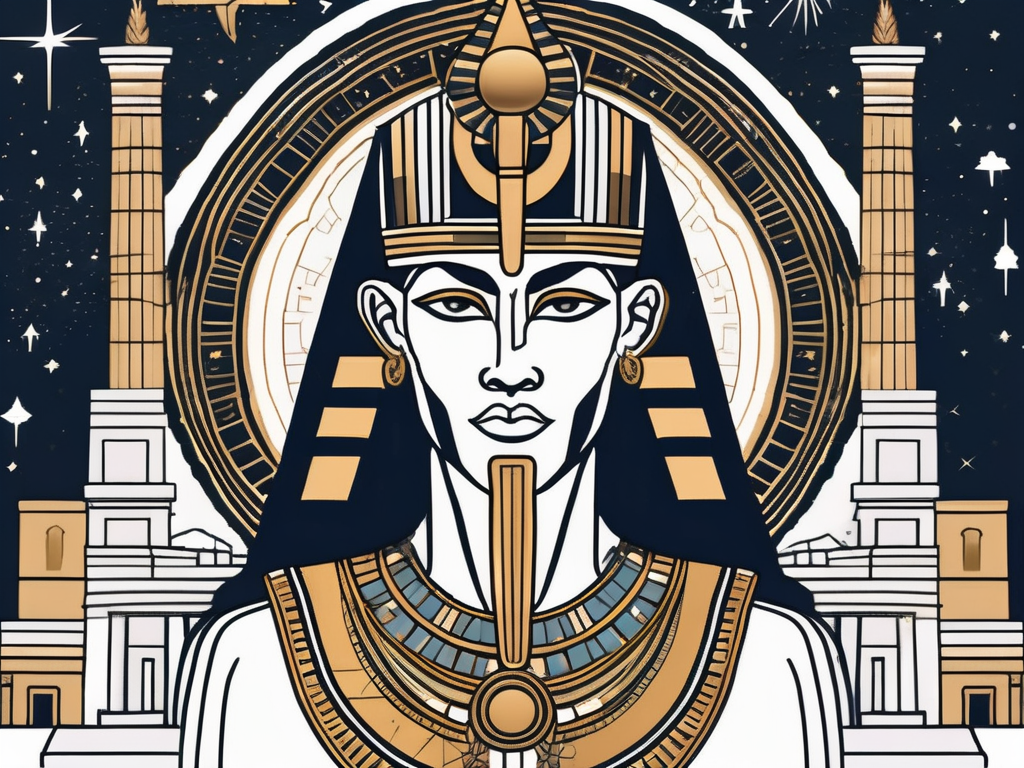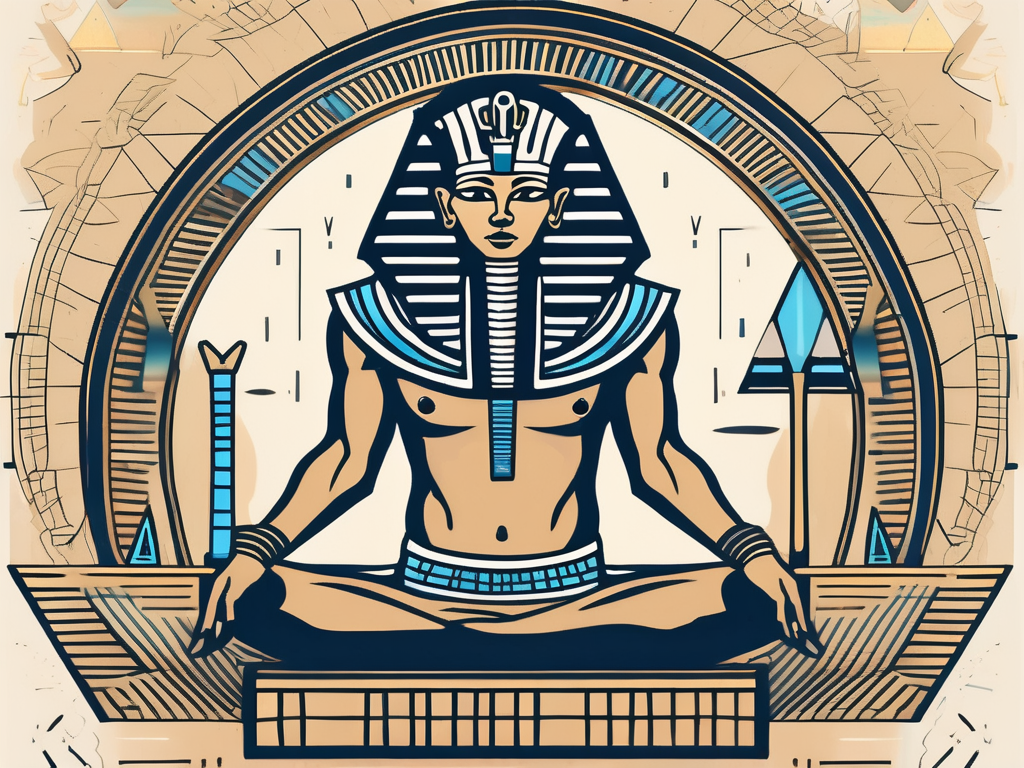Imhotep, known as the Egyptian God of Wisdom and Healing, holds a prominent place in the ancient mythology of Egypt. This remarkable deity is associated with wisdom and healing, embodying the intellect and medical knowledge of the ancient Egyptians. Let us delve into the fascinating world of Imhotep, exploring his role in Egyptian mythology, his historical significance, influence on medical practices, presence in art and literature, and the cult that worships him.
Understanding Imhotep’s Role in Ancient Egyptian Mythology
Imhotep’s significance in Egyptian mythology is rooted in his association with wisdom and healing. He is often depicted as a scholar, holding a scroll and wearing a headdress symbolizing knowledge. Imhotep’s wisdom encompasses various fields, including medicine, architecture, and astronomy. Ancient Egyptians turned to Imhotep for guidance and knowledge, seeking his assistance in matters of education and intellect.
Imhotep’s profound wisdom made him a revered figure in ancient Egypt. He was believed to possess divine knowledge and insight, guiding the pharaohs and the people. Imhotep’s wisdom extended beyond mortal limits, making him an intermediary between the gods and humanity. His teachings and counsel became the foundation for many ancient Egyptian practices and rituals.
Imhotep’s Association with Wisdom
Imhotep’s association with wisdom went far beyond his role as a scholar. He was known to have a deep understanding of the natural world, including the movements of the stars and planets. Imhotep’s astronomical knowledge allowed him to predict celestial events and their impact on earthly affairs, making him a trusted advisor to the pharaohs.
Furthermore, Imhotep’s wisdom extended to the realm of architecture. He was not only a scholar but also an accomplished architect, credited with designing some of the most magnificent structures in ancient Egypt. Imhotep’s architectural prowess was evident in his creation of the Step Pyramid of Djoser, a groundbreaking structure that revolutionized Egyptian pyramid construction.
Imhotep’s wisdom was not limited to intellectual pursuits alone. He was also known for his understanding of human nature and the complexities of society. Imhotep’s philosophical teachings emphasized the importance of balance and harmony, both within oneself and in the world. His wisdom guided individuals in their pursuit of a virtuous and fulfilling life.
Imhotep’s Connection to Healing
In addition to his association with wisdom, Imhotep is closely linked to healing. He is regarded as the patron deity of medicine and physicians in ancient Egypt. Imhotep’s expertise in medical practices allowed him to cure various ailments and diseases, providing relief to the suffering. His healing abilities were considered to be a gift from the gods, and his knowledge of herbal remedies and surgical techniques was ahead of its time.
Imhotep’s understanding of medicine went beyond the physical realm. He recognized the interconnectedness of the body, mind, and spirit, and believed that true healing required addressing all three aspects. Imhotep’s holistic approach to medicine included not only the use of herbal remedies and surgical procedures but also the incorporation of spiritual practices and rituals to promote well-being.
Imhotep’s reputation as a healer spread far and wide, attracting patients from all corners of ancient Egypt and beyond. People sought his guidance and treatment for a wide range of ailments, from common illnesses to more complex conditions. Imhotep’s healing sanctuaries became renowned centers of medical excellence, where physicians trained under his tutelage and patients found solace and hope.
Imhotep’s legacy as a healer is still celebrated today. His contributions to the field of medicine laid the foundation for future advancements and inspired generations of healers to follow in his footsteps. Imhotep’s name became synonymous with healing and wisdom, forever etching his place in the annals of ancient Egyptian mythology.
The Historical Imhotep: From Man to Deity
Imhotep was not only a mythical figure but also an actual historical person. He lived during the 27th century BCE and served as the high priest of the sun god Ra at the Temple of Heliopolis. Imhotep’s remarkable contributions to medicine, architecture, and literature earned him a revered status among the ancient Egyptians. Over time, Imhotep transitioned from being a mortal man to a deity, a testament to his divine qualities and achievements.
Imhotep’s life as a high priest was filled with significant responsibilities and duties. As the spiritual leader of the Temple of Heliopolis, he played a vital role in the religious practices of ancient Egypt. Imhotep officiated rituals and ceremonies, ensuring the people’s connection with the gods and maintaining harmony in the cosmos. His deep understanding of the religious traditions and his ability to communicate with the divine made him an indispensable figure in the ancient Egyptian society.
Aside from his religious duties, Imhotep was also known for his exceptional skills in medicine. He was regarded as the father of medicine in ancient Egypt, credited with numerous medical advancements and innovations. Imhotep’s extensive knowledge of anatomy, diseases, and treatments allowed him to provide effective healthcare to the people. His medical expertise was highly sought after, and he became a trusted healer and advisor to the pharaohs.
In addition to his contributions to medicine, Imhotep was also a renowned architect. He is credited with designing and overseeing the construction of the famous Step Pyramid of Djoser, the first pyramid ever built in Egypt. Imhotep’s architectural genius revolutionized the field of construction, introducing new techniques and concepts that would shape the future of Egyptian architecture. His innovative approach to building structures not only showcased his engineering prowess but also reflected his deep understanding of aesthetics and functionality.
Imhotep’s Life as a High Priest
As a high priest, Imhotep played a vital role in the religious practices of ancient Egypt. He officiated rituals and ceremonies, ensuring the people’s connection with the gods and maintaining harmony in the cosmos. Imhotep’s position as a spiritual leader allowed him to impart wisdom and guidance to both the pharaohs and the common people.
Imhotep’s influence extended beyond the religious sphere. He was also known for his literary contributions, writing numerous texts on various subjects, including medicine, architecture, and philosophy. His writings served as educational resources for future generations, preserving his knowledge and wisdom for centuries to come.
Imhotep’s reputation as a wise and knowledgeable individual earned him the respect and admiration of the ancient Egyptians. He was revered not only for his divine connection but also for his intellectual prowess and his ability to bring about positive change in society. Imhotep’s teachings and philosophies continue to inspire scholars and researchers to this day.
The Deification of Imhotep
Imhotep’s extraordinary accomplishments and divine reputation led to his deification after his death. The ancient Egyptians revered Imhotep as a god, elevating him to an immortal status. His transformation from a mortal being to a deity demonstrates the immense respect and admiration the people held for him.
Imhotep’s deification further solidified his position as a revered figure in Egyptian mythology. He became associated with healing, wisdom, and intellect, embodying the ideals and values that the ancient Egyptians held dear. Imhotep’s cult grew in popularity, with temples and shrines dedicated to his worship established throughout Egypt. People sought his divine intervention and guidance in various aspects of their lives, believing that he possessed the power to bring about healing, prosperity, and protection.
The legacy of Imhotep continues to endure, with his influence felt not only in ancient Egypt but also in the modern world. His achievements in medicine, architecture, and literature have left an indelible mark on human history, inspiring countless individuals to pursue knowledge and make significant contributions to society. Imhotep’s journey from a mortal man to a deity serves as a testament to the power of human potential and the enduring impact of one’s accomplishments.
Imhotep’s Influence on Medical Practices
Imhotep’s impact on medical practices in ancient Egypt cannot be overstated. His extensive knowledge and practical application of medicine laid the foundation for the development of ancient Egyptian healthcare. Imhotep’s teachings and discoveries shaped the methods and techniques used in healing for centuries to come.
Ancient Egyptian Medicine and Imhotep
The ancient Egyptian civilization made significant advancements in the field of medicine, largely influenced by Imhotep’s teachings. Imhotep’s medical treatises, known as the “Edwin Smith Papyrus,” contain valuable insights into anatomy, diagnosis, and treatment methods. These texts provide a glimpse into the sophisticated medical practices of ancient Egypt, with Imhotep as their guiding influence.
Imhotep’s Legacy in Modern Medicine
Imhotep’s contributions to medicine extend far beyond the ancient world. His methods and principles continue to inspire and inform modern medical practices. Physicians today recognize the importance of knowledge, compassion, and dedication, values epitomized by Imhotep. His legacy lives on in the ongoing pursuit of healing and the advancement of medical science.
Imhotep in Art and Literature
The captivating figure of Imhotep has left an indelible mark on both ancient and contemporary culture. Artists and writers have sought inspiration from his mythical and historical persona, immortalizing him through their creations.
Depictions of Imhotep in Ancient Art
Ancient Egyptian art often portrays Imhotep as an intellectual figure, adorned with a headdress symbolizing his wisdom. Artists captured his essence in sculptures, reliefs, and murals, depicting him alongside pharaohs and gods. These ancient works of art serve as a testament to the admiration and reverence Imhotep commanded during his time and the centuries that followed.
Imhotep’s Presence in Contemporary Literature
Imhotep’s mystique and influence continue to captivate contemporary audiences through literature. His character has been woven into fictional narratives, where he often serves as a wise mentor or a guiding presence. Authors draw upon his mythological attributes to enrich their stories with his timeless wisdom and healing powers, ensuring his legacy lives on in the world of literature.
The Cult of Imhotep
The worship of Imhotep has persisted throughout ancient Egyptian history and beyond. The cult dedicated to Imhotep’s veneration honors his divinity and the immense contributions he made to society.
Worship and Rituals Associated with Imhotep
Imhotep’s cult believed in his ability to bestow wisdom and healing upon his worshippers. They conducted rituals and offered prayers to seek his assistance in matters requiring knowledge or medical intervention. The followers of Imhotep revered him as a benevolent deity, seeking guidance and hope in their lives.
Imhotep’s Temples and Sacred Sites
Temples dedicated to Imhotep were built to pay homage to his divine presence. One of the most notable examples is the Temple of Imhotep in Saqqara, Egypt. These sacred sites served as gathering places for worshippers and focal points for religious ceremonies. Imhotep’s profound influence can still be felt in these remnants of the ancient world.
In conclusion, Imhotep, the Egyptian God of Wisdom and Healing, holds a significant place in ancient Egyptian mythology, history, medicine, art, literature, and religious practices. His legacy as a scholar, healer, and deity continues to inspire and captivate us today, reminding us of the enduring power of knowledge, compassion, and the pursuit of healing.












